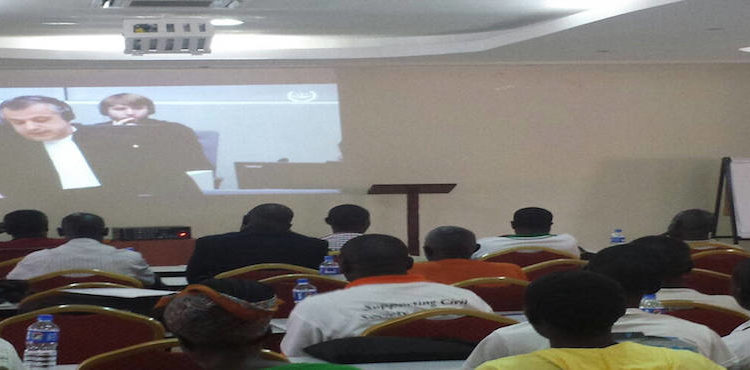By Susan Kendi
Lord’s Resistance Army soldiers cut the body of the villager into tiny pieces, cooked it and fed it to his neighbours. It was his punishment and theirs – he for helping an escaping child soldier to get to the Ugandan army and the villagers to discourage them from repeating his ‘mistake’.
Such was the ruthlessness with which desertion was punished in the LRA, as the former personal assistant to LRA commander Dominic Ongwen who is facing war crimes and crimes against humanity charges at the International Criminal Court.
Testifying under court protection mechanisms that include voice and image distortion, Witness P-330 told the ICC judges that he is still haunted by his memories of the war.
“Rotting corpses fall on me and start strangling me in the night. I also have terrible nightmares. That is the reason I do smoke because when such a thing happens I get up and start smoking.
“Sometimes when I am already in bed with my wife she would ask, ‘What’s wrong with you, are you getting mad?’” the witness told the court.
Prosecutor Beti Hohler asked when the witness’s brigade and another merged in a certain village in Northern Uganda.
Witness P-330 is testifying for the prosecution and is also registered as a victim. Besides the lawyers representing him as a victim, a legal advisor has been assigned to guide his testimony.
Victims lawyer Francisco Cox, who is representing a group of over 4,000 victims, asked him what he saw as the significance of educating his children, and he answered: “When you have no education, it is difficult for you to know what’s going on.”
With only two years of primary schooling, he became a fisherman to support his wife and their three children. He is the eldest in his family also takes care of his mother, two brothers, a cousin and two other children. He attended the first two years of primary school. His father worked in the Uganda army but died when he was still young.
Witness P-330’s post experiences might have been triggered by his abduction as a boy and the responsibilities allocated to him while still in the LRA.This is a clear indication of the impact that LRA might have had to some of its former soldiers leading to long time suffering referred to as complex trauma.
“From the bush there was no routine work that you would do. There was no schooling. You have to wake up early. You take your bedding. You don’t sleep on a normal bed; you sleep on grass. Sometimes you only have a jacket or just one bed sheet that you use covering yourself,” the witness told Cox.
There was irregularity and variations in how the LRA soldiers took their meals. “Sometimes you eat once a day. There are also days when you sleep hungry without food,” the witness said. It was difficult to develop relationships since one would be suspected to be planning a Panadol (escape).
“I was shot in my leg and a splinter from the gunship hit my arm … They (LRA soldiers) used warm water with soap for cleaning my wound and they also used Shea butter. This was done until the wound got cleared.”
Witness P-330 said he did not receive any medical attention after escaping from the LRA due to financial constraints. He testified that his mother was struggling to send him to hospital but there was no money hence his struggle with injuries today.
Additionally, he has chest problems after carrying the PK machine ammunition box that his unit used. “Sometimes when I cough, I cough out blood because I carried the PK tin for a long time.”
Nursing injuries in the LRA did not exempt a soldier from performing tasks allocated to him. The only tasks that were not assigned to those injured was to be on standby or attack. When Uganda government soldiers attacked an LRA position, everyone was expected to run carrying luggage –whether one was healthy or injured.
The witness had previously told the court that if the LRA was attacked and a person was cooking, he was expected to carry the food on his head with the saucepan still hot.







